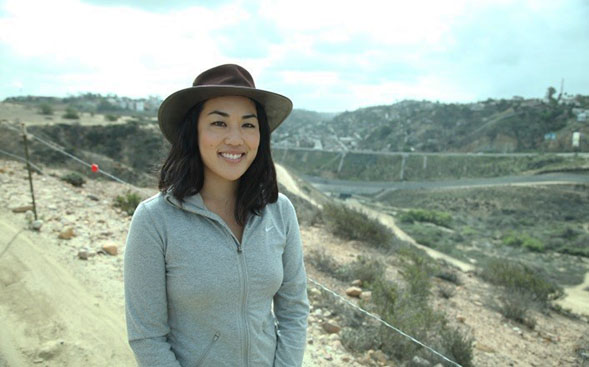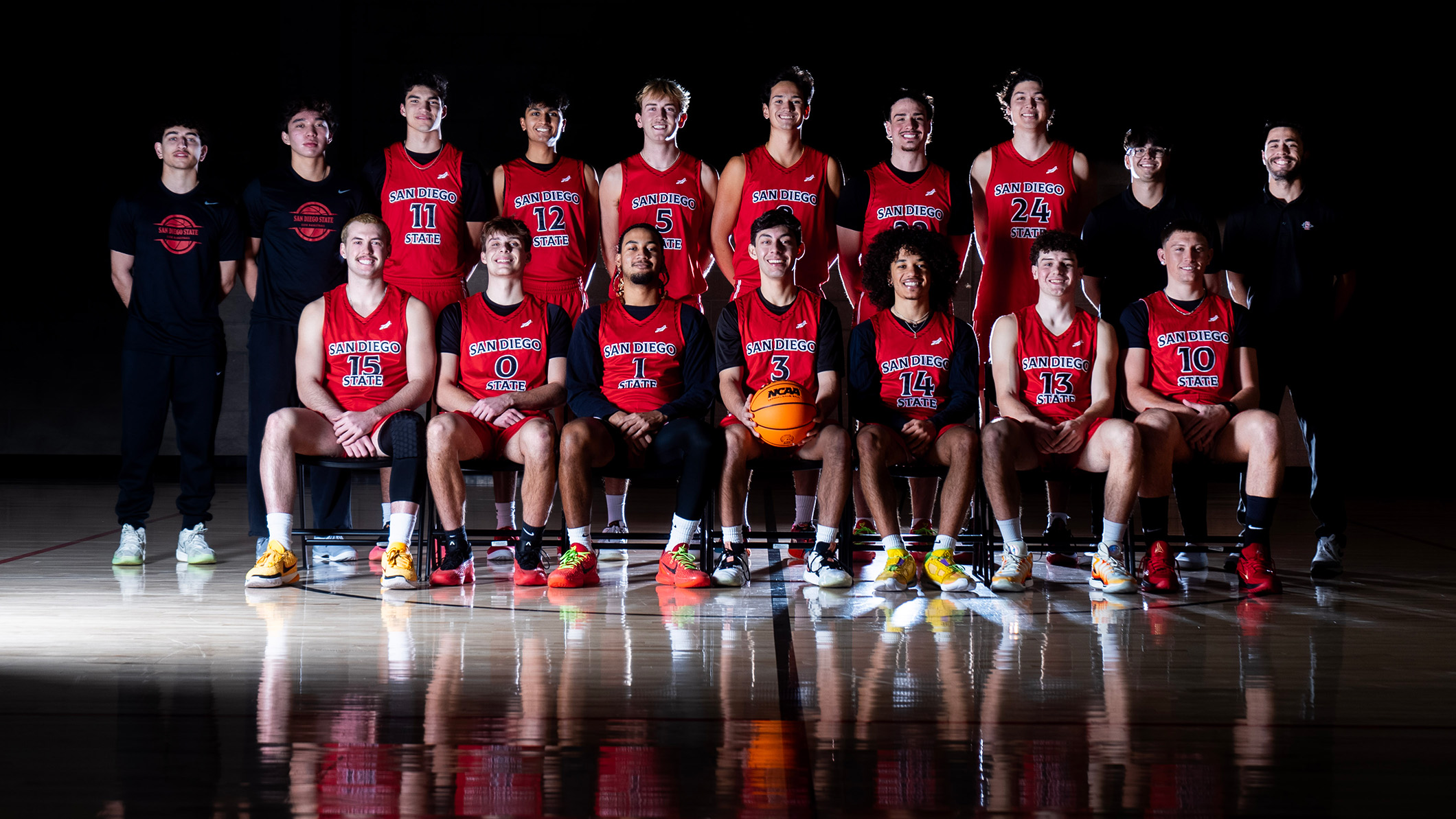10 SDSU Students Receive Inamori Foundation Scholarships
Each of the 10 SDSU students were awarded a $5,000 scholarship.

Each year as part of the Kyoto Prize Symposium, an event sponsored by the Inamori Foundation and held at San Diego State University, 10 SDSU graduate and Ph.D. students are selected as Inamori Fellows and receive $5,000 scholarships.
Each recipient is recommended by an SDSU faculty adviser or mentor and boasts noteworthy scholarly accomplishments such as awards, publications and presentations.
The following are the 2016-17 Inamori Fellows:
Erik Blackwood, Biology
Blackwood is a Ph.D. student in the cell and molecular biology joint doctoral program at SDSU and University of California, San Diego (UCSD). He was born and raised in San Diego and received his bachelor’s degree in biology and philosophy from the University of Notre Dame. Following that, he worked as an emergency medical technician for the County of San Diego until he found a home in the research lab of Chris Glembotski within the SDSU Heart Institute.
Blackwood’s current research focuses on hormonal secretion from the heart as a therapeutic target for hypertension and hypertrophic cardiomyopathy. He recently published articles in the journal Circulation Research and the Journal of Molecular and Cellular Cardiology, and presented his work at Tthe American Heart Association (AHA) Scientific Sessions and Gordon Research Conference.
Kelli Ilves, Biology
Kelli IlvesIlves is a graduate student in SDSU’s cell and molecular biology program. She is originally from Estonia and received her bachelor’s degree in gene technology from Tallinn University of Technology.
She has a passion for cardiovascular research and has been a co-author on work published in the Journal of Biological Chemistry and the Journal of Molecular and Cellular Cardiology. In November 2016, she presented her proposed master’s thesis project abstract at the AHA Scientific Sessions.
Samuel Lam, Public Health
Samuel LamLam is a second-year graduate student in public health with an emphasis in epidemiology in SDSU’s Graduate School of Public Health. He is also a clinical research fellow in the Department of Emergency Medicine at UCSD and a board certified pediatric emergency physician.
Lam's area of academic interest is the use and application of point-of-care ultrasound in the emergency department setting. He has co-authored seven peer-reviewed manuscripts since he began his studies at SDSU. Lam is collaborating with SDSU’s Caroline Thompson and Mingan Yang for his latest research, a multi-institutional study on the comparative effectiveness of emergency ultrasound guided management of pediatric soft tissue infections.
Garam Lee, Psychology
Garam LeeLee is a first-year graduate student in psychology at SDSU. She is originally from South Korea and graduated summa cum laude from California State University, Long Beach (CSULB), with a bachelor’s degree in psychology. Under the mentorship of SDSU psychologist Dustin Thoman, she is currently conducting research at the Motivation and Social Identity Lab.
Lee has focused her work on understanding what drives or motivates people to initiate and maintain interests until they develop specific and achievable goals, and what influences the psychological processes until people actually achieve those goals. She is passionate about developing and implementing theory-based psychological interventions targeting motivational processes to reduce achievement gaps in diverse educational settings. Lee has presented her work at a number of international conferences.
Barbara Quimby, Geography
Barbara QuimbyQuimby is a Ph.D. candidate in geography in SDSU’s joint doctoral program with the University of California, Santa Barbara (UCSB). She studies issues of social equity and community participation in fisheries management. Quimby’s dissertation research focuses on small-scale fishing communities in the Pacific Island nation of Samoa.
Quimby completed her bachelor’s degree in anthropology at Occidental College and received her master’s degree in anthropology from SDSU. Last summer, she led a research project on pier fishing in Santa Barbara County with a grant from the UCSB Chancellor’s Sustainability Graduate Research program. She presented some of the project’s preliminary findings at the Association of Pacific Coast Geographers meeting last fall, where she was also honored with the Margaret Trussell Scholarship for women in geography.
Ty Roach, Biology
Ty RoachRoach is third-year Ph.D. student in the cell and molecular biology joint doctoral program at SDSU and UCSD. He came to SDSU on a National Science Foundation Graduate Research Fellowship. Roach attended North Carolina State University on a varsity wrestling scholarship where he graduated as valedictorian with a triple major in biology, botany, and chemistry, with a minor in genetics. After graduation, he took a few years off from school to surf professionally and intern for the University of North Carolina Institute for Marine Sciences.
His experiences in and out of the water led him to Forest Rohwer’s lab at SDSU where he studies coral reefs. Roach’s doctoral research focuses on merging concepts from thermodynamics, evolution, and ecology to understand how heat produced by bacterial and viral communities affects coral reefs. For his research, Roach has been involved in several field expeditions, including work in Curacao, six of the Hawaiian Islands, and two months at sea in the Atlantic and Pacific oceans. He has recently presented his research at the International Coral Reef Symposium and at a seminar at the Swiss Federal Institute for Aquatic Science and Technology. Roach currently has three first-author articles in review, and he hopes to finish his doctoral work by the end of this year.
Kristine Taniguchi, Geography
Kristine TaniguchiTaniguchi is a Ph.D. student in the SDSU-UCSD joint doctoral program in geography. She received her bachelor’s degree in environmental science and her master’s degree in geography (watershed science), both from SDSU.
Taniguchi conducted various undergraduate research projects, including investigating water quality in the San Diego River, river erosion of Los Peñasquitos Creek, and sedimentation of the Tijuana Estuary. For her master’s thesis, she collaborated with the County of San Diego on investigating the impact of urbanization on stream channel erosion in San Diego County; presented her research at multiple professional conferences and technical advisory meetings; and published her findings in the Journal of Geomorphology.
Through her dissertation research on rapid urbanization and river erosion in Tijuana, Mexico, she and her advisor Trent Biggs are collaborating with the U.S. Environmental Protection Agency (EPA), U.S. Department of Agriculture (USDA), and two Mexican research institutions (CICESE and COLEF) to mitigate excess erosion in Tijuana and ultimately reduce the amount of sediment that is burying the Tijuana Estuary in San Diego.
Pedro Torres, Biology
Pedro TorresTorres is a Ph.D. student in the cell and molecular biology joint doctoral program at SDSU and UCSD. His fascination with biofilms encouraged him to dig deeper into microbiology, where he found his true calling in working to understand how complex microbial communities contribute to human health and disease.
Originally from Mexico, Torres became a first-generation college graduate after receiving his bachelor’s degree in biology from UCSB and his master’s degree in microbiology from SDSU. As a doctoral student, he is working under the mentorship of Scott Kelley. He will investigate how dysregulation of the intestinal microbiome in polycystic ovary syndrome (PCOS) is associated with the development of PCOS metabolic phenotype. Understanding the role of the intestinal microbiome in the development of the PCOS metabolic phenotype may expedite development of novel prevention, management and treatment options for women with PCOS including pre- and probiotic therapies.
Robert Wagner, Biology
Robert WagnerWagner was born in Ensenada, Mexico, and grew up in El Cajon. His family later moved to San Francisco where he attended high school and completed two years at City College of San Francisco. Wagner eventually transferred to Humboldt State University where he received his bachelor’s degree in cellular and molecular biology. He then worked at the University of California, San Francisco, studying childhood brain cancer through the Bridges to Stem Cell Research program. Working on human health issues eventually led him to pursue a career in prevention strategies, and ultimately towards environmental work and climate research. After working at the University of Colorado, Boulder, for more than a year, Wagner returned to San Diego to pursue a Ph.D. in ecology at SDSU.
His research focuses on how soil microbes affect atmospheric greenhouse gases. In particular, Wagner is researching microbial methane production in Arctic soils. Due to Arctic sea ice loss, and consequent decreased regional solar reflectivity, the Arctic is warming at about twice the rate of the rest of the planet. His goal is to determine how microbial characteristics can be used to better predict future Arctic methane production, and how this understanding can be implemented in current global climate models.
Che Wankie, Public Health
Che WankieWankie is a fourth-year student in the SDSU-UCSD joint doctoral program in public health with an emphasis in epidemiology. Wankie is a native of Cameroon. He received his bachelor of science degree in computer science and computer information systems from Mansfield University and continued his studies at CSULB, where he received a master’s degree in public health.
While pursuing his second master’s degree in applied statistics, Wankie lectured for CSULB’s health science department where he taught courses in statistics and research methods for four years.
Wankie’s next research project will examine motorcycle-related crash characteristics and injuries in Bamenda, Cameroon. Wankie is also an avid soccer player and salsa dancer.
SDSU’s Inamori Fellowship Program
The Inamori Fellowship application is open to any degree-seeking SDSU graduate student whose adviser is an SDSU faculty member. Applicants must have at least two semesters remaining in their program.
The scholarship foundation was established in 1984 by Kazuo Inamori, founder and chairman of Kyocera and KDDI Corporation.
For more information on the Inamori Fellowship Program, visit the Division of Research Affairs website.



